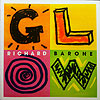Richard Barone, Glow
Published on September 14th, 2010 in: Music, Music Reviews, Reviews |By Christian Lipski

Sometimes it’s more difficult to write reviews for material that is sent from the publisher than it is to simply review material that you encounter by chance. The difference is that material from the publisher comes with Marketing Literature attached, to help the recipient understand just how amazing the owners feel the product they’re selling truly is. This assistance can be beneficial to reviewers who are looking for pull quotes or just more information about their decision to like the product.
On the other hand, sometimes the PR machine can try too hard and overshoot its product, making it seem like a comparative failure. In the case of Richard Barone’s fourth solo album Glow, it’s the latter, but not solely due to the press release. Barone himself seems to have either fallen for marketing’s high opinion or encouraged it in the first place. Taken on its own, Glow is a pleasant group of pop songs; a little light, but nice. When sampled after absorbing all the surrounding hype, though, it’s a pretentious pile that falls very short of its self-described ability.
Barone, former frontman of New Jersey-based ‘80s band The Bongos, is obviously a big fan of ‘70s glam artists, especially T. Rex’s Marc Bolan. His band covered “Mambo Sun” in 1982, his 1987 solo record contained “The Visit,” and 1997’s Between Heaven and Cello covered “Ballrooms of Mars.” So it’s not surprising that for the new album Barone is pulling out another T. Rex song, “Girl.”
It does, however, make it seem that Barone is claiming a certain kinship between himself and Bolan. Add in the presence of Bolan’s former producer Tony Visconti and Bowie’s photographer Mick Rock, and the claim becomes a bit more definite. On the back of the CD insert, Barone sits playing his guitar, cross-legged and barefoot, wearing a Lou Reed T-shirt and sequined jacket and gazing wistfully into the middle distance. Never has the phrase “assuming the mantle” been portrayed less subtly.
The press release accompanying the CD calls Barone “the king of chamber pop,” presumably because his early solo work included a cello. And in what seems like an attempt to push expectations so far out of proportion they wrap around themselves in an Einsteinian space-curve, it likens the disc to “a lost solo Beatles album from a glam-rock future world.” I’m assuming the writer added “solo” in order to keep some semblance of humility. The reader will also be interested to know that the equipment used on the CD was both “modern” and “state of the art,” which is always a good combination.
I implied earlier that when separated from its hype, Glow is a pleasing collection of tunes, and I mean that. There is a nice pop feel to the tracks, with catchy choruses and melodies. “1, 2, 3… Infinity” is the standout track, where the elements line up to create something interesting. Visconti’s production magic shines, and Barone’s voice, which is elsewhere slightly weak and rushed, fits like a missing puzzle piece.
The lyrics to “Silence Is Our Song” were written by the great Paul Williams (Phantom of the Paradise, etc.), and the track, recorded live at a radio station, comes on like a cut from a lost ‘70s soundtrack. The other non-studio song, “Radio Silence,” was written by Barone and recorded on his laptop using GarageBand, and sounds like a good song that was recorded at home, complete with slightly-out-of-tune acoustic guitars. I’d have been fine with this as a bonus “in progress” track, but firmly placed in the middle of the CD, it seems a little lost.
Barone’s only other solo creation, “Glow,” is solid enough. The arpeggio chords at the beginning are inconsistently played, which is odd considering that Barone is playing what the literature and liner notes call the “Gibson HD.6x-Pro Digital Les Paul guitar,” which, in an triumph for the obsessive or retake-prone musician, allows for individual tracking of each string.
Apart from the previous three songs and the respectfully-amplified T. Rex cover, all of the songs were co-written by Visconti. There are several very good musical moments, such as the glorious chorus of “Candied Babes” or the strutting and booming “Sanctified.” “Yet Another Midnight” is a lovely tune, with well-chosen harmonies and perfect backing from Visconti. The opening track, “Gravity’s Pull,” is another one that’s easy on the ears; it’s obviously written (or co-written) by someone who has a handle on pop music.
None of the tracks on Glow are horrible, none are unlistenable. They’re really quite nice, but brother, it’s not the lost solo Beatles record from the king of anything. If you go into this album with any knowledge of T. Rex or the Beatles, you will quickly feel cruelly misled. In writing this review, I found it a constant struggle to forget the claims of the PR release or the booklet and just listen to the music. I’m confident that I was able to focus where needed, but the aftertaste of Glow is unpleasant.
It’s a shame that Visconti was not brought in to produce and arrange the final track, an instrumental version of “Glow.” Visconti has a knack for drawing delicate and intricate string arrangement from the simplest chord structures, as he did for T. Rex, and he could have added some verisimilitude to the grandiose title of “Glow Symphony.” It does happen to be a fitting final track for the album, though, representing as it does a pleasant little piece of work with self-defeating delusions of grandeur.
Glow was released by Bar/None Records on September 14 and is available to purchase from their website. You can also check out Richard Barone’s website for links to order from Amazon and iTunes.
Time limit is exhausted. Please reload the CAPTCHA.